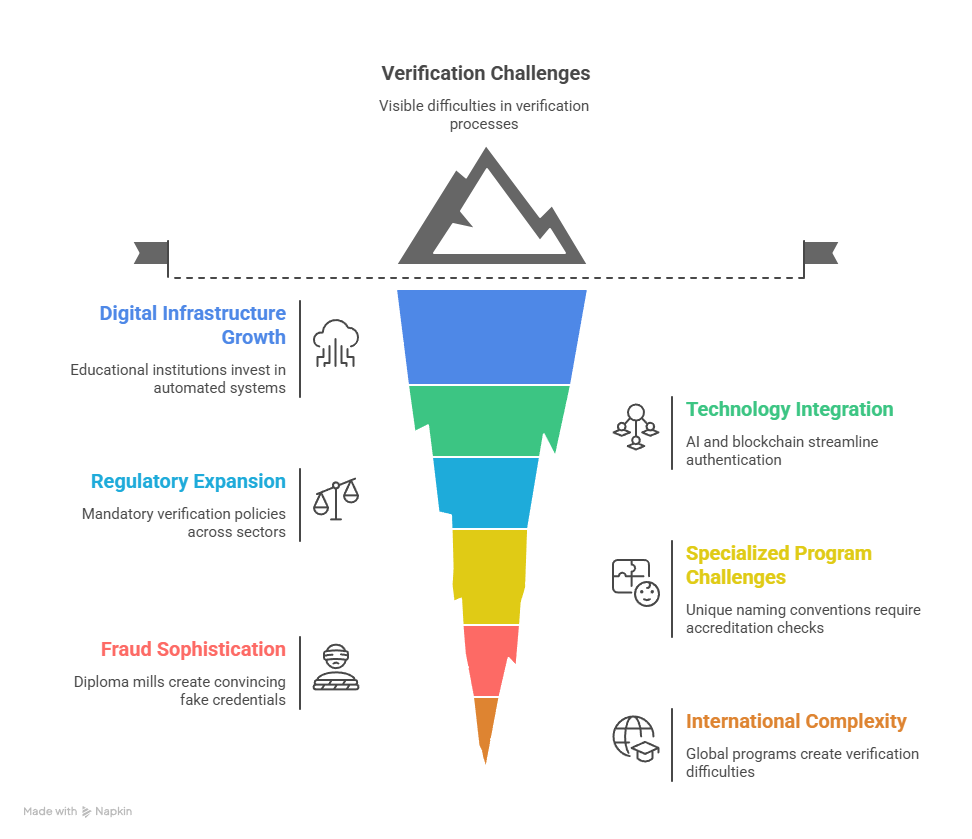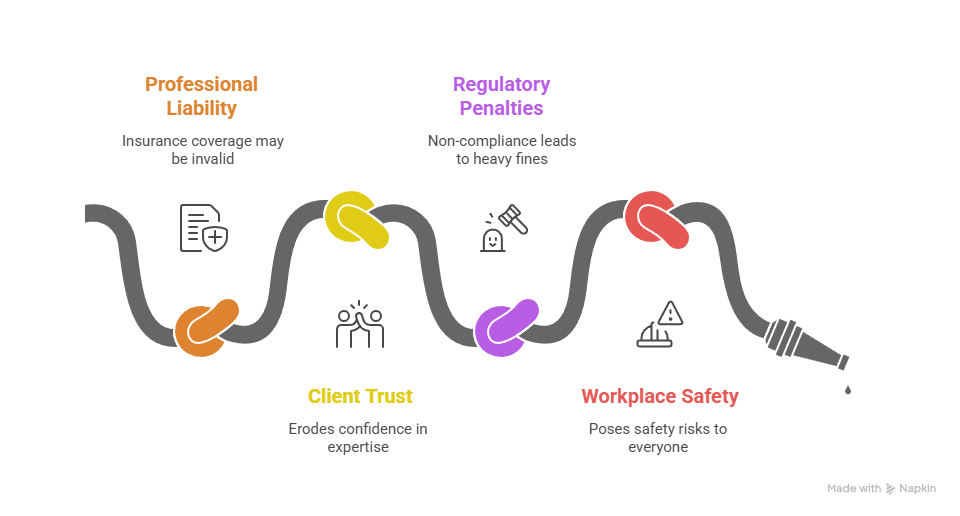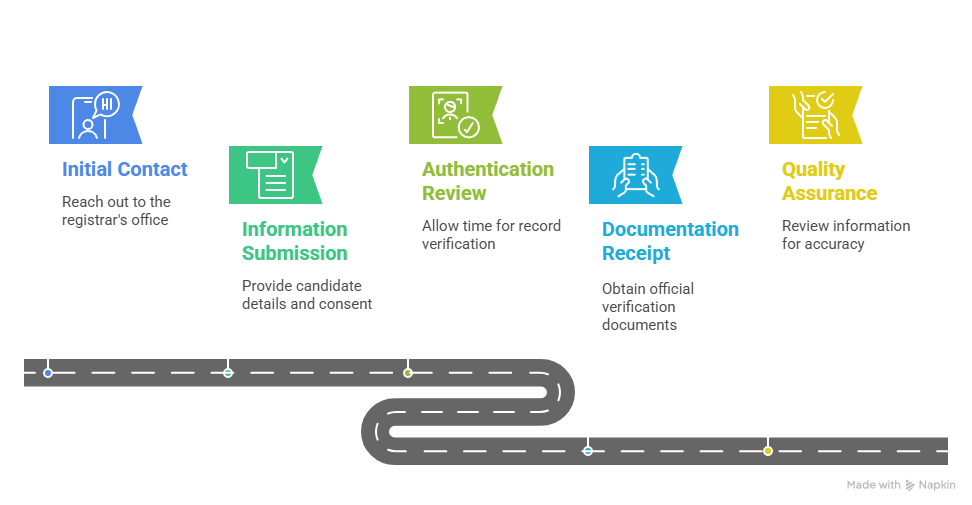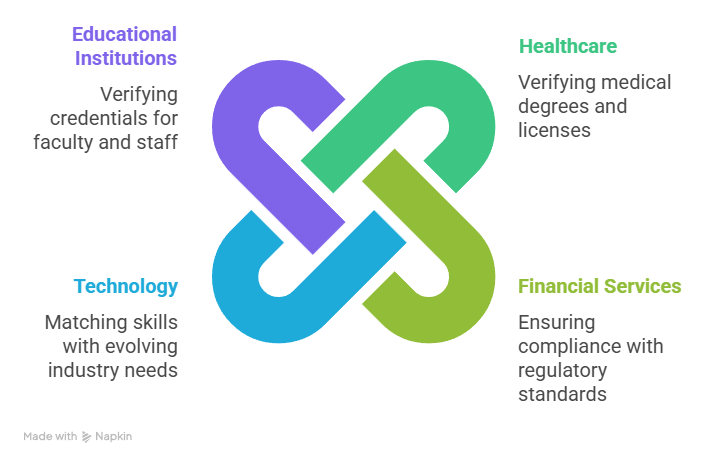Graduate degree verification is a critical component of employment screening that confirms a candidate's advanced educational credentials through academic institutions or third-party services. Employers who implement thorough verification processes reduce hiring risks, ensure regulatory compliance, and maintain workforce credibility while protecting against the growing trend of resume fraud.
Key Takeaways
- Graduate degree verification protects employers from credential fraud, which affects approximately 85% of companies according to 2024 industry studies
- The verification process typically takes 2-10 business days and costs between $15-75 per verification depending on the method chosen
- FERPA regulations allow employers to verify degrees with proper candidate consent, but limit access to specific educational details
- Digital verification platforms offer faster turnaround times and enhanced security compared to traditional phone-based verification methods
- International degree verification requires additional steps including credential evaluation and may take 3-4 weeks to complete
- Implementing standardized verification procedures helps organizations maintain legal compliance and reduce potential discrimination claims
Understanding Graduate Degree Verification in 2025
Graduate degree verification serves as the cornerstone of modern employment screening that ensures candidates possess the advanced qualifications they claim. This process involves confirming the authenticity of master's degrees, doctoral degrees, professional certifications, and specialized graduate programs through official channels. As remote work and global hiring expand, verification has become increasingly complex yet essential for protecting organizational integrity.
The current verification landscape presents several key developments that employers must navigate:

- Digital Infrastructure Growth: Educational institutions have invested in automated verification systems that reduce response times while maintaining accuracy standards, with many universities implementing digital platforms to handle unprecedented verification volumes
- Technology Integration: Modern verification systems integrate artificial intelligence and blockchain technology to streamline the authentication process while maintaining security standards and reducing processing time
- Regulatory Expansion: Organizations across healthcare, finance, education, and technology sectors have implemented mandatory verification policies as part of their comprehensive background check procedures due to heightened regulatory requirements
- Specialized Program Challenges: Programs in emerging fields like data science, cybersecurity, and digital marketing often have unique naming conventions that require verification of both degree completion and program accreditation
- Fraud Sophistication: Graduate-level credential fraud has become more sophisticated with the proliferation of diploma mills and fake online universities that create convincing websites and documentation
- International Complexity: Global education partnerships and joint degree programs create verification challenges that traditional systems struggle to handle effectively
Current industry data reveals that degree verification requests increased by 34% in 2024, driven by growing concerns about credential mills and fraudulent academic claims that can expose companies to significant liability risks. This trend reflects the critical importance of implementing robust verification procedures that can adapt to evolving educational models and technological advances while maintaining compliance with legal requirements.
Why Graduate Degree Verification Matters for Employers
Legal and Compliance Requirements
Professional licensing boards and regulatory agencies increasingly require verified educational credentials for employment eligibility. Industries such as healthcare, engineering, and finance face strict oversight regarding employee qualifications. Failure to verify degrees can result in regulatory violations, professional licensing issues, and potential legal liability.
The Fair Credit Reporting Act (FCRA) governs how employers conduct background checks, including educational verification. Employers must obtain written consent before verifying degrees and provide adverse action notices if verification results affect hiring decisions. Equal Employment Opportunity Commission (EEOC) guidelines require consistent verification practices to avoid discriminatory hiring patterns.
Risk Mitigation and Financial Protection
Hiring unqualified candidates can expose organizations to significant financial and reputational risks. Consider these critical protection factors:

- Professional Liability: Unverified credentials may invalidate professional insurance coverage
- Client Trust: Industries requiring specialized expertise depend on verified qualifications for client confidence
- Regulatory Penalties: Non-compliance with industry standards can result in substantial fines and sanctions
- Workplace Safety: Technical roles requiring advanced knowledge pose safety risks when filled by unqualified individuals
Organizations that skip verification face average costs of $240,000 per mis-hire. These costs include recruitment, training, and potential legal expenses. Comprehensive verification programs typically cost less than 0.1% of total hiring expenses while providing substantial risk reduction.
Industry-Specific Requirements
Healthcare organizations face particularly stringent verification requirements within their background check protocols. Medical professionals must demonstrate completed residencies, fellowships, and continuing education credits. Pharmaceutical companies require verified degrees for research positions to maintain FDA compliance. These requirements protect patient safety and regulatory standing.
Financial services companies must verify educational credentials to satisfy banking regulations as part of comprehensive background checks. The Federal Reserve and other regulatory bodies require documented proof of employee qualifications. Investment firms and banks implement comprehensive verification protocols that ensure compliance with fiduciary responsibility requirements.
Types of Graduate Degree Verification Methods
Modern employers have multiple verification options, each offering distinct advantages and limitations. Traditional phone-based verification remains common but faces challenges with institutional responsiveness and documentation requirements. Digital platforms provide enhanced speed and security through direct institutional connections and automated processing systems.
Third-party verification services offer comprehensive solutions that include international degree validation, credential evaluation, and ongoing monitoring capabilities. These services typically provide faster turnaround times and specialized expertise in handling complex verification scenarios as part of broader background check services. Costs vary significantly based on service levels and geographic requirements.
| Verification Method | Average Cost | Turnaround Time | Accuracy Rate |
| Direct Institution Contact | $0-25 | 5-15 business days | 92% |
| Third-Party Services | $15-75 | 2-10 business days | 98% |
| Digital Platforms | $10-50 | 1-5 business days | 99% |
Advanced verification methods now include blockchain-based credential systems and AI-powered fraud detection algorithms. These technologies provide real-time verification capabilities and enhanced security features that traditional methods cannot match. Blockchain systems create tamper-proof records that enhance long-term verification integrity.
National Student Clearinghouse represents the largest verification database in the United States. This service provides instant verification for millions of graduates from participating institutions. The clearinghouse offers enrollment verification and degree completion tracking. Not all institutions participate in this system, particularly smaller colleges and international schools.
Many background check companies now integrate graduate degree verification with other screening services. This integration allows employers to conduct comprehensive candidate evaluations efficiently. Employers can verify degrees alongside employment history, criminal records, and reference checks. Bundled services often provide cost savings and streamlined reporting.
Step-by-Step Graduate Degree Verification Process
Pre-Verification Preparation
Effective verification begins with proper candidate communication and consent documentation. Employers must clearly explain the verification process, obtain written authorization, and establish realistic timelines for completion. This preparation phase prevents delays and ensures FCRA compliance throughout the verification process.
Documentation requirements include candidate consent forms, degree information details, and institutional contact procedures. Employers should collect complete institutional names, graduation dates, degree types, and any relevant student identification numbers. Accurate information collection significantly reduces verification timeframes and prevents processing delays. This preparation integrates seamlessly with other background check components.
Conducting the Verification
The verification process involves multiple steps designed to ensure accuracy and completeness:

- Initial Contact: Reach out to the registrar's office or designated verification department using official institutional channels
- Information Submission: Provide required candidate details and consent documentation according to institutional policies
- Authentication Review: Allow institutions time to locate records and verify degree completion status
- Documentation Receipt: Obtain official verification documents or certificates as proof of degree completion
- Quality Assurance: Review received information for accuracy and completeness before finalizing verification
Most institutions require 3-10 business days for standard verification requests. Rush processing may be available for additional fees, though availability varies by institution and time of year. Academic calendars can significantly impact processing times, especially during summer breaks and holiday periods.
International Degree Verification Considerations
International graduate degree verification requires additional steps and specialized knowledge of foreign educational systems. Credential evaluation services provide expert analysis of international degrees and their US equivalents. These services typically require official transcripts, degree certificates, and detailed course descriptions translated into English.
Time requirements for international verification often extend 3-4 weeks due to communication challenges and documentation requirements. Costs range from $100-300 per evaluation, depending on complexity and urgency. Employers should factor these extended timelines into hiring schedules when dealing with international candidates.
Educational systems vary significantly between countries, creating verification complexity. European degrees follow the Bologna Process, which standardizes credit systems and degree structures. Asian and African educational systems often require detailed analysis to determine US equivalency. Specialized credential evaluation services provide essential expertise in these assessments.
Documentation and Record Keeping
Proper documentation ensures compliance with legal requirements and provides audit trails for verification activities. Employers must maintain verification records for specified periods, typically three to seven years depending on industry regulations. These records must be stored securely to protect candidate privacy and comply with data protection laws.
Digital record-keeping systems offer advantages over paper-based filing. These systems provide searchable databases, automated retention schedules, and secure access controls. Cloud-based storage ensures disaster recovery capabilities and remote access for distributed HR teams. Integration with broader background check management systems streamlines record keeping across all screening activities.
Common Challenges and Solutions in Degree Verification
Institutional Response Delays
Educational institutions face high verification request volumes, particularly during peak hiring seasons and academic year transitions. Registrar offices may experience staffing limitations or outdated processing systems that create verification delays. These challenges require proactive planning and alternative verification strategies.
Solution approaches include establishing institutional relationships, utilizing preferred vendor networks, and implementing buffer time in hiring schedules. Many organizations maintain databases of institutional contacts and processing requirements to streamline future verification requests. Third-party background check services often provide faster alternatives when direct institutional contact proves challenging.
Peak hiring seasons coincide with academic calendar transitions, creating perfect storms for verification delays. Spring graduation periods see increased verification volumes while staff may be focused on commencement activities. Summer breaks often reduce institutional staffing levels. Employers should plan verification timelines around these predictable delays.
Fraudulent Documentation Detection
Sophisticated degree fraud requires advanced detection methods beyond basic institutional verification. Fraudulent diplomas, fake transcripts, and credential mill operations present ongoing challenges for employers. Modern verification must include fraud detection protocols and specialized investigative resources as part of comprehensive background check procedures.
Detection strategies encompass multiple validation points:
- Institutional Accreditation: Verify that degree-granting institutions maintain proper accreditation status through recognized agencies
- Document Authentication: Examine official seals, signatures, and paper quality for signs of forgery or alteration
- Database Cross-Reference: Compare reported information against national student clearinghouse and institutional databases
- Timeline Verification: Confirm that graduation dates align with candidate employment history and other biographical information
Advanced fraud detection services utilize artificial intelligence to identify suspicious patterns and flag potentially fraudulent credentials for additional investigation. Machine learning algorithms analyze thousands of data points to identify inconsistencies that human reviewers might miss.
Institutional Closures and Mergers
College closures have increased significantly in recent years, creating verification challenges for graduates. When institutions close, student records may transfer to state agencies or partner colleges. This process can take months or years to complete. Recent graduates from closed institutions may face verification difficulties during their background check process.
Institutional mergers create similar challenges with name changes and record consolidation. Universities may operate under multiple names during transition periods. Degree programs may be discontinued or renamed during merger processes. These changes require specialized knowledge to navigate successfully.
Professional background check companies maintain databases of institutional changes, closures, and record transfers. This specialized knowledge helps resolve verification challenges that employers might struggle to handle independently. Partnering with experienced providers often proves cost-effective for complex verification scenarios.
Technology Solutions for Graduate Degree Verification
Digital transformation has revolutionized degree verification through automated platforms and integrated screening solutions. Modern technology reduces processing times while improving accuracy and security standards. Cloud-based systems provide real-time status updates and comprehensive audit trails for compliance documentation.
Artificial intelligence enhances verification through pattern recognition, fraud detection, and automated quality assurance protocols. Machine learning algorithms identify inconsistencies and flag potential issues for human review. These technological advances significantly reduce manual processing requirements while maintaining verification accuracy standards.
| Technology Feature | Benefit | Implementation Cost |
| AI Fraud Detection | 95% accuracy improvement | $5,000-15,000 annually |
| Blockchain Verification | Tamper-proof records | $10,000-25,000 setup |
| API Integration | Real-time processing | $2,000-8,000 annually |
Integration capabilities allow verification platforms to connect with existing HR information systems and applicant tracking software. These connections streamline data flow and reduce manual data entry requirements throughout the hiring process. Integrated systems provide centralized dashboards for monitoring verification status across multiple candidates.
Mobile applications now enable real-time verification monitoring and candidate communication. HR professionals can track verification progress, receive instant notifications, and communicate with verification providers from mobile devices. This capability proves especially valuable for distributed HR teams and remote hiring processes.
Blockchain Technology Applications
Blockchain technology offers revolutionary approaches to credential verification by creating immutable records of educational achievements. Universities can issue digital diplomas that candidates control while providing instant verification to employers. These systems eliminate traditional verification delays while enhancing security against fraud.
Several major universities now participate in blockchain credential pilots. MIT, Harvard, and other leading institutions have issued thousands of blockchain-verified certificates. Widespread adoption requires industry-wide collaboration and standardization efforts that may take years to fully develop.
Background check companies are beginning to integrate blockchain verification capabilities into their service offerings. These integrations will eventually provide instant, tamper-proof verification results. Current adoption remains limited due to implementation costs and standardization challenges.
Best Practices for Employers
Successful degree verification programs require standardized procedures, clear timelines, and consistent application across all candidates. Organizations should develop written policies that outline verification requirements, processing steps, and decision-making criteria. These policies ensure legal compliance and reduce potential discrimination claims while integrating seamlessly with broader background check procedures.
Training programs for HR professionals should cover verification procedures, legal requirements, and technology platform usage. Regular training updates help staff stay current with evolving regulations and industry best practices. Documentation requirements include maintaining verification records for compliance audits and legal protection.
Training should address these key areas:
- FCRA Compliance: Understanding legal requirements for background screening and candidate rights
- Technology Platforms: Proper use of verification systems and troubleshooting common issues
- Fraud Detection: Recognizing suspicious credentials and escalation procedures for potential fraud cases
- International Verification: Special requirements for foreign degree validation and credential evaluation
- Record Keeping: Documentation standards and retention requirements for verification records
Quality assurance protocols should include regular accuracy audits, vendor performance reviews, and candidate feedback collection. These measures help organizations maintain verification program effectiveness and identify improvement opportunities. Regular policy reviews ensure compliance with changing regulations and industry standards.
Cost Management Strategies
Verification costs can accumulate quickly for organizations with high-volume hiring. Employers should implement cost management strategies that balance thoroughness with budget constraints. Volume discounts from verification providers often reduce per-verification costs for large employers.
Strategic verification timing can also reduce costs. Conducting preliminary screenings before verification eliminates costs for candidates who do not advance in the hiring process. Conditional offers subject to verification allow employers to prioritize verification spending on selected candidates.
Bundling graduate degree verification with other background check services often provides cost savings. Comprehensive background check packages typically offer better per-service pricing than individual verification requests. Bundled services provide consistent reporting formats and streamlined vendor management.
Candidate Communication Best Practices
Clear candidate communication prevents verification delays and improves the hiring experience. Employers should explain verification requirements during initial interviews or job postings. This transparency helps candidates prepare necessary documentation and set appropriate timeline expectations for their background check process.
Regular status updates keep candidates engaged during verification processes. Automated systems can provide real-time updates without requiring HR staff time. Clear escalation procedures help resolve verification issues quickly when problems arise.
Candidates appreciate detailed explanations of verification requirements and potential delays. Providing verification checklists or preparation guides demonstrates professionalism and reduces candidate anxiety. Alternative arrangements for urgent hires can maintain business continuity while verification processes complete.
Industry-Specific Verification Requirements
Different industries have unique verification requirements based on regulatory oversight and professional standards. Healthcare organizations must verify medical degrees, residencies, and continuing education requirements as part of comprehensive background checks. Licensing boards require ongoing verification for license renewal and professional standing.

Financial services companies face strict regulatory requirements for employee qualifications. Banks must verify degrees for compliance officers, risk managers, and other key positions through thorough background check processes. Securities firms require verified credentials for investment advisors and research analysts. These requirements protect investors and maintain market integrity.
Technology companies increasingly verify degrees for cybersecurity, software engineering, and data science positions. Rapid technological change requires current education verification to ensure candidate skills match evolving industry needs. Government contracts often require verified credentials for security clearance eligibility during background check processes.
Healthcare Sector Requirements
Healthcare verification extends beyond degree completion to include licensing, certifications, and malpractice history within comprehensive background check protocols. Medical professionals must maintain current licenses in practice states. Hospitals and clinics verify board certifications, fellowship training, and continuing medical education credits.
Nursing verification requires degree confirmation plus licensing verification in practice states. Advanced practice nurses must verify graduate degrees in specialized fields. Healthcare facilities often verify clinical training locations and preceptor evaluations for quality assurance.
Healthcare background check companies specialize in medical credential verification and maintain relationships with licensing boards and medical institutions. These specialized services understand healthcare-specific requirements and provide faster, more accurate verification results than general background check providers.
Education Sector Verification
Educational institutions hiring faculty and administrators require comprehensive degree verification as part of their background check procedures. Teaching positions often require verification of degrees, certifications, and teaching credentials. Administrative positions may require specialized education degrees or certifications.
K-12 schools must verify education degrees and teaching certifications for all instructional staff. State education departments maintain databases of certified teachers and administrators. Private schools may have different verification requirements based on accreditation standards.
Educational background check services understand the complexity of academic credential verification and maintain relationships with certification boards and educational institutions. These services provide specialized expertise in verifying teaching credentials, administrative certifications, and continuing education requirements.
Regulatory Compliance and Legal Considerations
Graduate degree verification operates within a complex regulatory framework that varies by industry and jurisdiction. The Family Educational Rights and Privacy Act (FERPA) governs educational record disclosure, while the Fair Credit Reporting Act (FCRA) regulates background screening procedures. Employers must navigate these regulations carefully to avoid legal complications.
State-level regulations add another layer of complexity to verification procedures. Some states have specific requirements for educational background checks, particularly in healthcare and education sectors. Ban-the-box laws in various jurisdictions may affect timing of verification requests relative to other background screening activities.
Data privacy regulations like the California Consumer Privacy Act (CCPA) and General Data Protection Regulation (GDPR) impact how verification data is collected, stored, and processed. Organizations operating across multiple jurisdictions must comply with the most restrictive applicable regulations to ensure comprehensive compliance.
Employment attorneys recommend maintaining detailed documentation of verification procedures and decisions. This documentation provides legal protection in case of discrimination claims or regulatory audits. Consistent application of verification policies across all candidates helps demonstrate fair hiring practices.
Conclusion
Graduate degree verification represents a critical investment in organizational success and risk management that extends far beyond simple credential checking. Employers who implement comprehensive verification programs as part of their background check procedures protect themselves from fraud, ensure regulatory compliance, and maintain competitive advantages through verified talent acquisition. The evolution of verification technology continues to provide new opportunities for enhanced accuracy, reduced processing times, and improved candidate experiences. As hiring practices become increasingly sophisticated, degree verification remains an essential component of professional employment screening that supports organizational integrity and long-term success.
Frequently Asked Questions
How long does graduate degree verification typically take?
Standard graduate degree verification takes 2-10 business days depending on the verification method and institutional responsiveness. Direct institutional contact may require 5-15 days, while third-party services often complete verification within 2-7 business days. International degree verification can extend to 3-4 weeks due to additional documentation requirements.
What information do I need to verify a graduate degree?
You need the candidate's full name, institution name, graduation date, degree type, and written consent for verification. Additional helpful information includes student ID numbers, maiden names if applicable, and specific program details. Accurate information reduces processing delays and improves verification success rates.
Can employers verify degrees without candidate permission?
No, employers must obtain written consent before conducting educational verification under FCRA requirements. Candidates have the right to know about verification activities and receive copies of verification reports. Unauthorized verification attempts may violate privacy laws and expose employers to legal liability.
How much does graduate degree verification cost?
Verification costs range from $15-75 per degree depending on the service provider and verification complexity. Direct institutional contact may cost $0-25 but requires more time and effort. Third-party services charge $15-75 for standard verification, while international degrees may cost $100-300 including credential evaluation.
What happens if a degree cannot be verified?
Unverifiable degrees require additional investigation to determine the cause and appropriate response. Common reasons include institutional closures, name changes, or record-keeping issues rather than fraud. Employers should work with candidates to obtain alternative documentation before making adverse employment decisions.
Are online graduate degrees as verifiable as traditional degrees?
Yes, accredited online graduate degrees are fully verifiable through the same institutional channels as traditional degrees. The verification process remains identical regardless of delivery method. However, employers should verify that online programs maintain proper accreditation from recognized agencies to ensure degree validity.
How do you verify international graduate degrees?
International degree verification requires credential evaluation services that assess foreign educational systems and provide US equivalency determinations. The process involves submitting official transcripts, degree certificates, and course descriptions translated into English. Verification typically takes 3-4 weeks and costs $100-300 per evaluation.
What are the legal requirements for degree verification?
Employers must comply with FCRA regulations including obtaining written consent, providing disclosure notices, and following adverse action procedures if verification affects hiring decisions. EEOC guidelines require consistent verification practices to avoid discriminatory hiring patterns. State laws may impose additional requirements for specific industries or positions.
Additional Resources
- Fair Credit Reporting Act (FCRA) Compliance Guide for Employers
https://www.ftc.gov/business-guidance/resources/using-consumer-reports-what-employers-need-know - National Student Clearinghouse Degree Verification Services
https://www.studentclearinghouse.org/colleges/student-tracker/ - U.S. Department of Education Database of Accredited Institutions
https://ope.ed.gov/dapip/ - EEOC Guidelines on Employment Background Screening
https://www.eeoc.gov/newsroom/eeoc-enforcement-guidance-consideration-arrest-and-conviction-records-employment - Society for Human Resource Management (SHRM) Background Screening Resources
https://www.shrm.org/resourcesandtools/tools-and-samples/toolkits/pages/backgroundchecks.aspx - International Credential Evaluation Services Directory
https://www.naces.org/members.html

GCheck Editorial Team
Meet the GCheck Editorial Team, your trusted source for insightful and up-to-date information in the world of employment background checks. Committed to delivering the latest trends, best practices, and industry insights, our team is dedicated to keeping you informed.
With a passion for ensuring accuracy, compliance, and efficiency in background screening, we are your go-to experts in the field. Stay tuned for our comprehensive articles, guides, and analysis, designed to empower businesses and individuals with the knowledge they need to make informed decisions.
At GCheck, we're here to guide you through the complexities of background checks, every step of the way.






